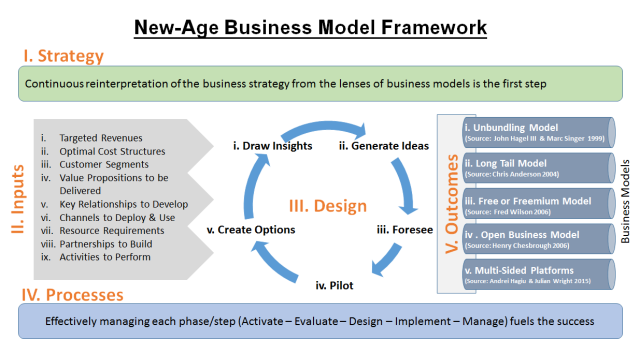Top 5 Innovative Business Models
*Get your crypto project/offer published on this blog and news sites. Email:contact@cryptoexponentials.com
Global businesses are redesigning their business models either to come out of growth complacency or realize above normal growth from current levels of performance. I was trying to understand the attributes that enable companies to disrupt their own business models. Tabling here a high-level framework to generate “New Age Business Models”. Quite obviously there are many mature frameworks available over the last decade in this field. In fact I have leveraged the existing literature on the business model innovation examples and made references as appropriate to collate and articulate a types of business models relevant to current times in this post.

I see primarily five constituents for either to generating a new business model or to alter an existing model. Any business model should start with an overall Business Strategy. Companies have to continuously reinterpret their evolving business strategy from the lenses of their business model(s) and do the reality check in confirming the business model to the strategy. This follows carefully capturing all the Inputs that drive in developing or altering a business model. Inputs should encompass all potential revenue streams and targets, cost structures, customer segments, value propositions, customer relationships, channels, resources, partners and activities to perform. The third constituent is the Design of business model. Companies have to work rigorously on drawing insights from inputs, generate minimum viable ideas, visualize outcomes, pilot the patterns and create potential options of business models. Maintaining Process rigor is at most important in business model generation exercise. Effectively managing each phase/step (Activate – Evaluate – Design – Implement – Manage) fuels the success. The last step is coming up with Outcomes and choose right business model for your business.
List of business models
Fundamentally there are FIVE business models for new age businesses. Companies have to tailor and evolve their business model from close match of either a single business model or hybrid models based on key characteristics of their business.
- Unbundling Business Model (Source: John Hagel III & Marc Singer 1999): Vertically integrated companies unbundle based on three fundamental business types – customer relationship business, product innovation business, or infrastructure management business. Whilst it is possible to manage across all three areas, think Apple, some businesses can benefit from the separation. Recommended reading “Unbundling innovation: Samsung, PCs and China” http://ben-evans.com/benedictevans/2014/7/10/unbundling-innovation
- Long Tail Model (Source: Chris Anderson 2004) : The theory of the Long Tail is that our culture and economy is increasingly shifting away from a focus on a relatively small number of “hits” (mainstream products and markets) at the head of the demand curve and toward a huge number of niches in the tail. As the costs of production and distribution fall, especially online, there is now less need to lump products and consumers into one-size-fits-all containers. In an era without the constraints of physical shelf space and other bottlenecks of distribution, narrowly-targeted goods and services can be as economically attractive as mainstream fare. Recommended reading – Monetizing the “Long Tail” with Big Data @ https://infocus.emc.com/william_schmarzo/monetizing-the-long-tail-with-big-data/
- Free or Freemium Model (Source: Jarid Lukin / Fred Wilson 2006): Freemium is simply the business model of giving away your core service for free and then attracting more users through word of mouth. When these users have integrated the core service into their daily routines they discover that there is another layer of the service that is available for a fee. A percentage of the free users will recognize these features as valuable to them, trust the company providing them because they are already using the core service, and pay to upgrade. Recommended reading – The Freemium Business Model
- Open Business Model (Source: Henry Chesbrough 2006): Good ideas are widely distributed today. No one has a monopoly on useful knowledge anymore. Useful knowledge is no longer concentrated in a few large organizations, business leaders must adopt a new, “open” model of innovation. Using this model, companies look outside their boundaries for ideas and intellectual property (IP) they can bring in, as well as license their unutilized home-grown IP to other organizations. Recommended reading – Open Innovation and Open Business Models: A new approach to industrial innovation @ https://www.oecd.org/science/inno/37915612.pdf
- Multi-Sided Platforms (Source: Andrei Hagiu & Julian Wright 2015): Brings together two or more distinct but interdependent groups of customers. Value is only created if all groups are attracted and addressed simultaneously. The intermediary generates value by facilitating interactions between the different customer groups, whereas the value increases when more users are attracted. This phenomenon is known as the network effect. There is growing interest in the economics of multi-sided platforms (MSPs), which get two or more sides on board and enable interactions between them (e.g., Airbnb, eBay, Uber, Xbox etc.). Recommended reading – Multi-Sided Platforms @ http://www.hbs.edu/faculty/Publication%20Files/15-037_cb5afe51-6150-4be9-ace2-39c6a8ace6d4.pdf
Stay tuned to this blog for further elaboration on the “New-Age Business Model Framework” and use cases that substantiate and help deepening our understanding.
Related Article: Technology Entrepreneurship






